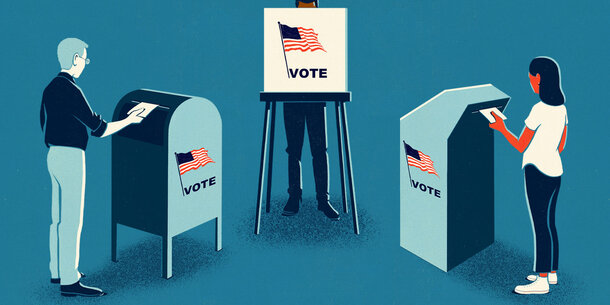The Brennan Center for Justice, the Elections Group, and Institute for the Future offer ways that election officials can prevent or reduce harm caused by AI
Hypothetical situations and solutions help election officials plan for 2024 elections, protect voting against AI
Contact:
Rebecca Autrey: Brennan Center for Justice at NYU Law, autreyr@brennan.law.nyu.edu, 202–753–5904
Rebecca Roberson: The Elections Group, rebecca@electionsgroup.com, 719–413–8073
Jean Hagan: Institute for the Future, jhagan@iftf.org, 650–740–1386
Today the Brennan Center for Justice at NYU Law, the Elections Group, and Institute for the Future (IFTF) released How Election Officials Can Identify, Prepare for, and Respond to AI Threats. Developed by experts in election administration, cybersecurity, and AI, this new tool provides scenarios for hypothetical situations involving AI-related attacks on election infrastructure, attempts to spread misinformation about voting, and efforts to interfere with election officials’ work. The scenario planner offers practical advice for responding to these threats.
“Many election officials we’ve spoken to have said that despite the considerable hype around how AI may disrupt elections, they do not have the detailed guidance they would like to prepare,” said Lawrence Norden, senior director of the Elections & Government Program at the Brennan Center for Justice at NYU Law. “This scenario planner provides them with that guidance, and shows they already have much of the knowledge and technology they need to help prevent AI from unsettling election operations this year.”
The planner was inspired by authors’ conversations with election officials about concerns over AI and lessons learned from Arizona election officials’ tabletop exercises on AI in December 2023. Among the hypothetical situations in the scenario planner:
- A deepfake video uses an election official’s voice and image to spread false instructions on how to vote.
- An election staffer receives a convincing, AI-generated phishing email directed at election officials with bait links that could infect the election systems with malware.
- Logistical disruptions such as phone calls seeking information about polling place hours are automated to flood election office phone lines as well as staff mobile phones. AI systems can generate calls that are highly personalized to mimic real people and voters by sharing real voters’ data, and can potentially overwhelm staff, resources, and interrupt election work.
“Advances in AI technology have added the kind of sophistication to deepfakes and misinformation that we have never seen before. It’s important for our elections officials to be able to anticipate and be ready for this,” said Toshi Hoo, Emerging Media Lab Director at Institute for the Future (IFTF). “Learning how to spot, identify, and better prepare for AI-generated content meant to interfere with their work is essential to mitigating these kinds of disruptions.”
For each scenario in the planner, the authors make recommendations for handling it, with specific steps for stopping an attack and reducing the damage.
“Election officials have been preparing for this moment since 2016, and certainly since 2020, enhancing cyber and physical security and public communications, all through strong partnerships. The 2024 election layers in generative AI, increasing the need for election officials to be performing well on all fronts, which is why we created the AI Planner,” said Noah Praetz, the president and co-founder of the Elections Group, a nonpartisan election administration consulting firm. “This tool reinforces that dedication to the comprehensive approach they’ve taken to security will support their efforts at navigating AI threats effectively.”
###
About the Brennan Center for Justice at NYU Law
The Brennan Center for Justice is an independent, nonpartisan law and policy organization that works to reform, revitalize, and when necessary, defend our country’s systems of democracy and justice.
About the Elections Group
The Elections Group is a nonpartisan election administration consulting firm. It’s a team of election experts that supports election professionals by promoting collaboration, fostering thought leadership, and elevating best practices through the development of training materials and other resources.
About Institute for the Future
Institute for the Future (IFTF) is the world’s leading futures organization. For over 55 years, businesses, governments, and social impact organizations have depended upon IFTF global forecasts, custom research, foresight education and training to navigate complex change and develop future-readiness strategies. IFTF methods and tools yield views of transformative possibilities across all sectors that together support a more equitable and sustainable future. IFTF is a registered 501(c)(3) nonprofit organization based in Palo Alto, California.




